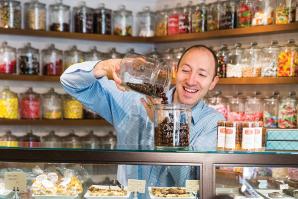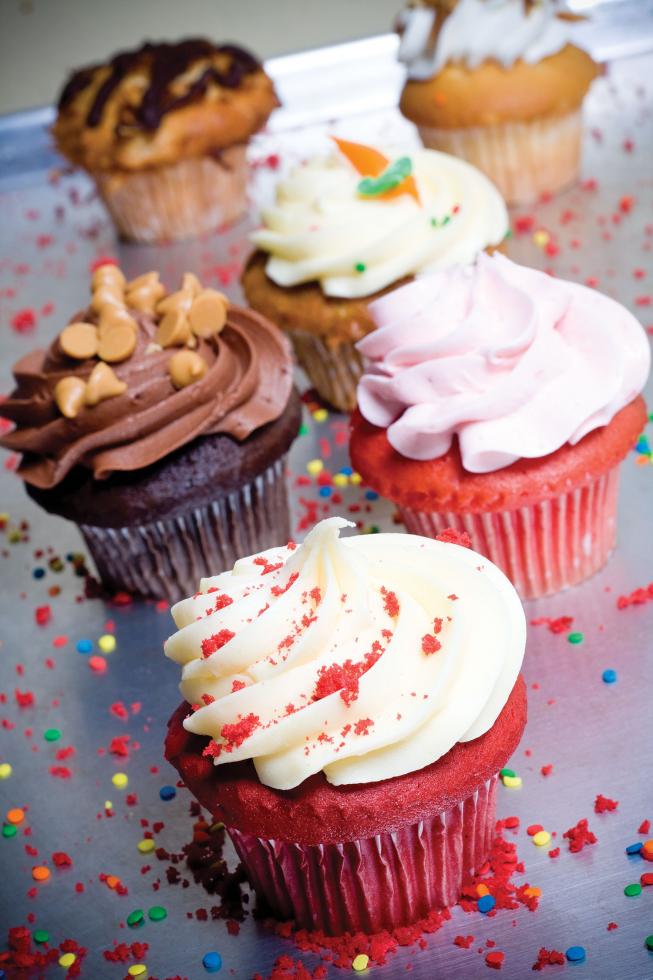If there’s anyone more excited than a kid in a candy shop, it’s a middle-aged woman in a cupcake shop. The national cupcake craze also has hit all regions and demographics, according to those in the bakery industry.
But after several years as a food trend, will cupcakes continue to be the dessert in demand at weddings, birthday parties and business conventions? Or, as some foodies have suggested, is the cupcake craze subsiding?
Recent reports by the Los Angeles Times and National Public Radio speculate cupcakes are on their way out and pie will be the trend for 2011. In August, USA Today predicted it would be donuts. Others suggest it’s brownies.
If so, many in the baking world don’t believe it. The New York Times recently reported cupcake chain Crumbs Bake Shop is going public through a $66 million merger with an investment company as it plans to expand from 34 stores to 200 by 2014.
Industry observers say cupcakes, with top flavors of red velvet, carrot cake and chocolate/vanilla, will remain hot — at least for the next few years. Although some cupcakeries have shut down, they’ve been replaced by startups and expansions. In Sacramento proper, stores have come and gone since the first opened in 2007, but have grown overall to about eight. Likewise, local bakeries say cupcakes are still flying off the shelves.
“I don’t see the demise of cupcakes on the horizon,” says Paul Sapienza, Retail Bakers of America’s vice president of operations. “They’ve enjoyed a longer life span than most people were willing to give them a few years ago.”
Nichelle Stephens, co-editor for six years of the national blog Cupcakes Take The Cake, agrees. “We counted 422 U.S. cupcake bakeries listed on our blog in the fall, and about 20 have opened since” in both cities and small towns, she says. She’s counted 140 cupcake bakeries internationally in such locales as Europe, Australia and Dubai.
Like the gourmet coffee industry, the cupcake business has potential for staying power and a high profit margin, Stephens says. “People can charge $3 or $4 a cupcake, and they’re pennies to make,” she says. It’s also easy to scale up without hiring lots of workers.
This makes it possible for new startups like Dina Neils’ online business, Cupcake and the City, which launched last summer. She works alone, baking special-event orders in her Elk Grove home. “I dream of the day I will have a spectacular storefront and a handful of employees,” she says.
So why cupcakes over other baked goods? Cupcakes are portable, decadent yet portion-controlled, require little cleanup, allow each person to choose a flavor and topping and, typically at $2.50 to $3.50, are affordable.
“They are small bits of wonderfulness, easy to eat without forks and plates, and they are cute,” says Marlene Goetzeler, who has owned Freeport Bakery with her husband, Walter, since 1987.
“They’re just happy food,” Stephens adds, noting they evoke fond memories of childhood. “They facilitate an easy celebration. You can just put a candle on a cupcake, and it’s an instant party.”
— Marlene Goetzeler, owner, Freeport Bakery
Sapienza says they may be recession-proof because of their
affordability. Industry watchers say cupcake businesses who fail
do so for the same reasons other small businesses fail, such as
poor business planning, customer service, product quality,
location or marketing.
“Some of these people starting cupcake bakeries don’t have that much business experience,” Stephens says. “You can’t ignore the fundamentals because what you’re baking is so popular.”
Jake Jacobsen co-owns the region’s first cupcake specialty shop Cupcake Craving with baker Gordy Cisneros, and says his company has stood up to the growing competition by trying to “never say no” and by keeping prices low — $2.50 a cupcake.
With three stores, in Sacramento, Folsom and Davis (at Davis Creamery), the company’s “always doing a little bit better” with future plans to expand. “I just delivered 850 to a corporate convention this morning,” he says.
Shops should also pay attention to changes in consumer taste and the role of technology in marketing, such as social media. Many already appeal to niche markets, offering vegan and gluten-free choices, or try new ideas such as bite-sized cakes, cake pops, cake push-ups such as Sprinkles’ CakeShooter, and even “cupcakes” made entirely of candy, sold by Ooh La La Candy.
Christee Owens, owner of Icing on the Cupcake, has shops in Rocklin, Folsom and Sacramento. “We spend a lot of time in the test kitchen creating new flavors and fun designs to go along with holidays and advertising campaigns.” The results? Her business sells 55,000 cupcakes a month, has 45 employees and has been approached by investors for expansion.
“I don’t think (cupcakes’ popularity) will ever die out as long as people keep coming up with new ideas,” says Tessa Lindow Huff, owner of The Frosted Cake Shop in midtown. She cites masculine “man cupcakes,” events that pair cupcakes with beer and wine and TV shows like “Cupcake Wars” on Food Network and “D.C. Cupcakes” on TLC that keep cupcakes in the forefront.
Stephens has noticed another new trend: sending a cupcake rather than, say, flowers, as a thank you gift. “The market’s not saturated yet,” she says. “People haven’t thought of every single cupcake gimmick yet.”
Recommended For You

Rapid Success
Chris Johnson is an impatient inventor with a purpose
Chris Johnson is the inventor of Rapid Ramen Cooker, a square, microwaveable bowl that cooks ramen in four minutes. What he evidently lacks in patience, he makes up for in ingenuity.

Avoid the Post-15 Flop
Turn your business’ 15 minutes of fame into long-term success
It may seem that landing that New York Times interview, getting featured on the front page of AOL or winning a $135,000 business contest means that, as a business owner, you are set for life. In truth, it’s just the beginning.



